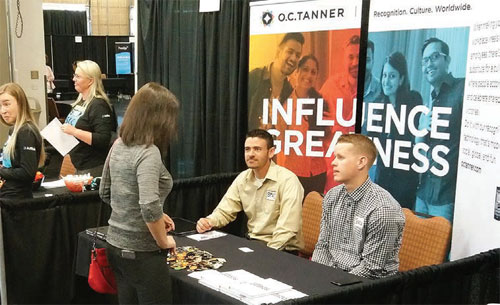By Brice Wallace
Cameron Williams wants to see Utah become “stickier.” And that, he says, would be a good thing.
Speaking as part of a panel at the recent third annual Diversity Career Fair organized by L3 Technologies, Williams said helping new Utahns from out-of-state make connections to the state and its various communities can help employers retain workers. The same holds true for people raised here who might be wanting to leave the state, he added.{mprestriction ids="1,3"}
As several panelists noted, “diversity” tends to focus on hiring, while “inclusion” tends to be about retention.
“To me, if you want to retain talent, you have to think about people from a very human perspective. What is it that motivates any human being, at its base level? The answer is, the feeling of importance,” said Williams, director of diversity and principal sales architect at Domo.
His own experience has included having a Utah employer who gave him work options, offered a diversity director role and suggested he serve on the board of a black chamber of commerce. He also got involved in a church. All were ways of making connections, he said.
“Every human being is motivated in some way by feeling important. What Utah did for me was it made itself very ‘sticky’ in finding ways to feel important in the community and in my job,” Williams said. “There’s a lot of ways to integrate people into the community to where it’s like, this is actually home to me, and I believe we as employers can facilitate that and help that.”
Nchopia Nwokoma, director of culture at England Logistics, said affinity groups allow like-minded people to become friends. Those groups can be a bike-riding club, folks who eat a keto diet, women’s organizations and veterans groups, among others, she said — anything that can forge bonds among people.
“Now they have this connection at work, which makes work a better place to be for them,” Nwokoma said. “And a happier employee, an engaged employee, they’re going to produce more, they’re going to contribute to the bottom line a little bit better than someone who’s not engaged. So, it really is beneficial for everyone: The employee is happy, the business is happy, and people have friendships.”
Margarita Angelo, vice president and diversity recruitment officer at Zions Bank, said companies should encourage workers to serve on boards or committees or be in groups — “something they have a passion for,” she said. “And we’re going to get them involved, especially the millennials because they want to be part of something bigger.”
Williams said that in addition to encouraging workers to serve on committees and boards, employers also have some financially focused ways to help new Utahns feel welcome and develop ties to the community and company.
“If you go recruit talent from out of state, how cheap would it be for a company to invest $5,000 to help that person put a down payment on a new home? How sticky does that make Utah when you do that?” he asked.
Another option is having companies pay for travel to allow an employee to work from their home state two weeks each year, a cost of only $1,000 or $2,000. “That’s super-cheap when it comes to retaining that talent, right?” he said. “So, there are little things that you could do to encourage people and help people to feel that human feeling of wanting to be desired somewhere that can make Utah sticky. I personally feel we don’t do enough of it.”
He said he’s often asked my family members living in Chicago why he is in Utah and why he stays. “Because I don’t feel as important in Chicago as I feel right here in Utah,” he acknowledged, “and I think that resonates for a lot of people.”
Nwokoma said companies need to better understand their employees and the diverse perspectives that they bring to the business. Emma Houston, director of diversity and inclusion at the Salt Lake County Mayor’s Office, said that “knowing who you are, being able to say, ‘I belong in this space’ and having other people recognize that you belong in this space without being apologetic about it, that is a challenge.”
Companies and organizations need to work to eliminate the hiring barriers and exclusionary practices and focus on welcoming people because of their potential, panelists said. Language used in job descriptions and images and language on company websites and social media should be reviewed to ensure they foster a culture of inclusion, they said.
Houston suggested that companies interested in diversity and inclusion can make connections at the Utah Juneteenth Festival or Pacific Islander events and find qualified job candidates there.
Another focus of the panel was having company leaders involved in diversity and inclusion.
“It starts at the top,” Houston said. “It starts with the CEO and the top leadership teams, that the CEO sets the narrative for the organization. And whatever that initiative is to ensure that diversity, inclusion, high performance and equity is all involved, it has to start at the very top level. And then the buy-in needs to happen when you get champions. … It’s one thing to say, ‘This is what I want to happen’ and apply it to everyone else out there but not take an active role in making that happen.”
Diversity, inclusion, high performance and other attributes need to be defined and made part of company policies, procedures, missions and values statements, she said.
Selma Mlikota, manager of diversity and inclusion at O.C. Tanner, agreed.
“If you don’t have that executive buy-in, from the top down,” she said, “it just is not going to happen.”{/mprestriction}








